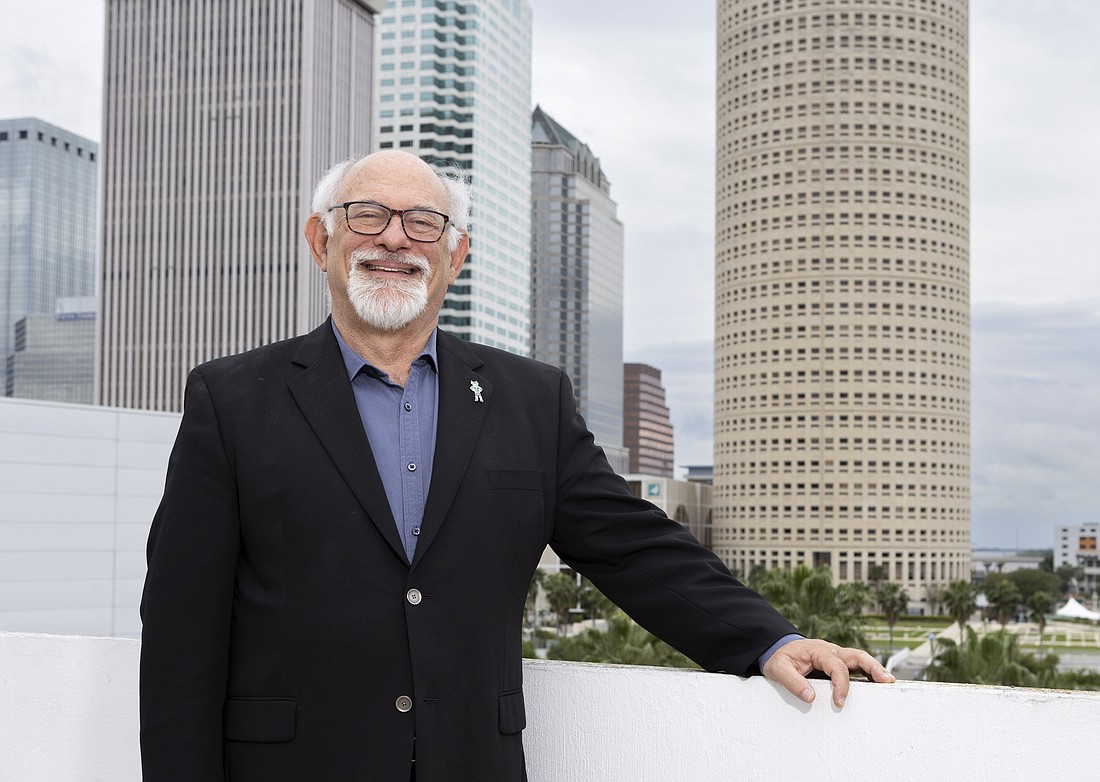- July 26, 2024
-
-
Loading

Loading

When he walked into his office on his first day of new job in higher education in 2022, despite already being an accomplished academic and University of South Florida executive, Eric Eisenberg had an all-too familiar concern of businesspersons — really, of anyone new on the job.
How do I do this?
Eisenberg, a former dean of the USF College of Arts and Sciences, had been promoted to USF senior vice president of University Community Partnerships.
His mission? To get this new department to "streamline" the process by which community organizations approach and establish important partnerships with the large, three-campus state university — recognized nationally as a top research university.
Despite first-day jitters, Eisenberg appears to have figured the job out, especially in creating business links. One example: he helped create a sports and entertainment MBA program that Lightning owner Jeff Vinik and his team asked for.
And Eisenberg and UCP's Cyber Florida division also worked with USF officials to create a new college within the public university that will be focused solely on cybersecurity, artificial intelligence and computing tech in general. That significant addition, announced March 21, will add to USF's existing 14 colleges.
His success shows the Eisenberg principle: Anyone can get first day nerves.
For USF to give Eisenberg the job seemed logical. He had executive experience as dean and was also working as interim provost and executive vice president at the time of his appointment in late 2022. He taught in California for a time and arrived in Florida in 1993, as a USF professor of communication and a director of graduate studies. From 1996 to 2007, he was chair of the USF Department of Communication. From 2008 to 2022, he served as dean of the College of Arts and Sciences.
USF targeted several sectors, not just one, like health or business or advocacy, as some colleges do, says Eisenberg. So his task seemed extra large: He was to build engagement and partnerships with businesses, governments, the military, schools and advocacy groups.
The experience as dean was perhaps more important than he thought, as USF began to marshal its forces and arrange five sub-departments under Eisenberg: Lifelong Learning, Community Engagement, Cyber Florida, the Institute for Applied Engineering and the Global and National Security Institute. In total, the center has 160 employees.
Eisenberg was now the dean of partnerships.
USF wanting to deal with the five whole Tampa Bay sectors — things that vary as much as MacDill Air Force Base to a manufacturer to an environmental group — didn't scare Eisenberg. The university describes the department's mission rather dryly: "A key strategic goal for USF to be a major social and economic engine through creating robust global, national and regional partnerships that help build a prosperous and sustainable future."
Eisenberg adds to that simply by saying he thought it would be "cool" to establish links that run through all parts and lives of Tampa Bay. That's how Eisenberg found himself pulling together partnerships that had previously existed before his office was created, but were not necessarily linked in any way.
Many of them were with businesses.
"We have literally hundreds and hundreds of business relationships, at all different levels," says Eisenberg, who, as a communicator by profession, makes sure to decline to take credit for those pre-existing relationships. "What this office has done is create a one-stop shop and sort of institutionally pull together those relationships."
One example is the career fair his department puts on. Another is a software program it developed for internships.
And an example on the other side was a company growing into Pasco County eager to hire USF grads. But they wanted to make sure the students had run through an appropriate curriculum.
"I said, 'let me know what kind of jobs you are hiring for and we will prepare the curriculum,'" says Eisenberg. "The need for talent is great."
Eisenberg is also working closely with incubators and accelerators such as Tampa Bay Wave and Embarc Collective. "This has been like a shock to me," says Eisenberg. "I didn't realize so much of my job was dealing with small companies and startups and what they call the entrepreneurial ecosystem ... It's very exciting, and I love it."
Eisenberg notes the partnership program comes at a time when the nation is debating the value of a college education. It's a debate in which USF and others must define themselves, he says.
The partnership program can help define educational value by promoting USF research that informs daily practice in business, advocacy and government. And USF has distinguished itself as a research university, he says.
Eisenberg notes that in 2023, USF was invited to join the Association of American Universities, the top 3 or 4% of universities in the country. So now that means more research and that means students do better work, he says.
Powering that engine of education is the Tampa Bay region, he says, and its real-world contributions: its business data and encouragement, its advocacy groups and environmental research, the military input and more.
"We're figuring out that our communities are our superpower, and we want to grow and excel alongside the success of the Tampa Bay region," Eisenberg says.